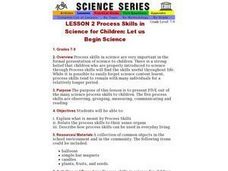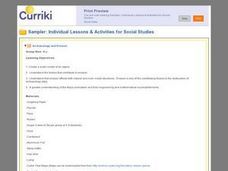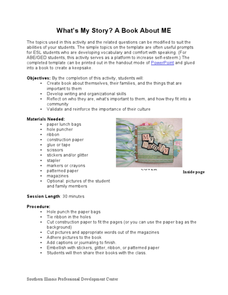Curated OER
LESSON 2 Process Skills in Science for Children: Let us Begin Science
Students study five process skills used in learning science and how they can be used in daily life.
Curated OER
Where Do Animals Come From?
Young scholars use library search engines to research an animal and its origin. For this animal research lesson, students research their assigned animal using ProQuest. Young scholars then find the country of origin of the animal using a...
Curated OER
Creating and Outline From Research
Fourth graders develop 3 research questions about a topic they choose and categorize the information they have learned. For this research lesson plan, 4th graders use a variety of non fiction materials from the library.
Curated OER
Message Drafted by General Eisenhower in Case the D-Day Invasion Failed
Students discuss how much effort and planning would therefore be needed to plan a secret invasion such as D-Day. They use library and Internet resources to find out what strategies were employed on D-Day and what the results of D-Day were.
Curated OER
Holocaust Theme
Students complete a unit of lessons on the events of the Holocaust during WWII. They write daily journal entries, create a collage, view and discuss videos, read and analyze novels and poetry, and complete a novel project.
Curated OER
Modern Japan Unit Plan
Sixth graders research modern Japanese culture, society and traditions, examine relationship between Japanese culture and its environment,
compare and contrast Japanese Society with Canadian Society, compare lives of people in Japan with...
Curated OER
Simulating a Middle East Peace Summit
Tenth graders explore the issues in the Middle East. In this World History lesson, 10th graders research the problems between Palestine and Israel. Students write a speech on their point of view of the peace process.
Curated OER
You are the Curator: Building a Museum of the 1920s and 1930s
Students examine primary and secondary sources regarding 1920's and 1930's America. In this Webquest lesson, students explore sources regarding the American decades in order to create their own museum exhibits.
Curated OER
Archaeology and Erosion
Sixth graders study how erosion affects archaeology sites. In this investigative instructional activity, 6th graders construct a model of a pyramid using sugar cubes. They will investigate in groups how water, wind, and sunlight affects...
Curated OER
Web of Life Game: Trout
Students explore the concept of food webs. In this food web lesson, students demonstarte the connection between species. Students use a ball of string show how the food web works, then have a class discussion.
Curated OER
Trout Are Made of Trees Crayon Mural
Learners recognize that for a trout habitat to be ideal, several components must be present. In this trout lesson, students explore what makes a healthy stream. Learners create paintings for a mural of a trout habitat....
Curated OER
Math Shortcuts
While the idea is great, to help pupils understand shortcuts to solve multiplication and division problems, this lesson doesn't lay out the steps necessary for successful comprehension. There are a few examples to show how to use...
Curated OER
What's My Story? A Book About Me
Have your class create keepsake books about themselves. This activity is a presented as a basic idea with minimal justifications or classroom applications. However, with a little effort, this could become a full lesson. Add a rubric,...
Curated OER
Reading for Tone and Inference
Using a reading passage, this lesson leads learners through an exploration of a text. This activity focuses on identifying what the reading passage is about, its tone, and key elements.
Curated OER
Potato Experiment
Spur a discussion of germs using this lesson. Learners conduct an experiment with potatoes to determine how germs are transmitted. They then discuss ways to prevent the spread of germs. The emphasis is on hand washing.
Curated OER
ADULT ESOL LESSON PLAN--Level 2--Time and Money
Students , while daily reviewing the vocabulary terms on the board, identify and practice writing ordinal and cardinal numbers and know when to use them correctly. In addition, students are asked to share ordinal and cardinal numbers in...
Curated OER
LESSON 4: Looks Like Respect, Sounds Like Respect, Feels Like (K-2)
Students show competency in Art objectives by designing and creating props (glasses-looks, ears-headband, and [feel] texture board) for each of the given senses.
Curated OER
Lesson 3: Where Does Money Come From?
Students listen to story Hundred Penny Box by Sharon Bell Mathis, explore history of money, and examine how money is produced in the United States. They discuss why money is used for exchange, and describe how money has changed over time.
Curated OER
Integrated Social Studies and Math Lesson
Fourth graders study the American Civil War. They read and analyze information regarding the casualties of the Civil War, fucusing on Indiana soldiers. They graph the information and then write in their reflective journals responding...
Curated OER
What Can We Learn from Primary-Source Documents? Lesson 2
Students extrapolate information from primary-source documents. They read and research to create a whole-class timeline of events leading up to 1867 and Confederation.
Curated OER
Bridges for All Lesson 1: Fighting Chance (1850-1877)
Students study how a Quaker woman, Laura Smith Haviland, served as a lifeline for fugitive and freedmen during the American Civil War era. They research other philanthropic organizations and the associate vocabulary of this era.
Curated OER
Gospel Beginnings - Lesson 1
Students identify genres of music that influenced musical style of Aretha Franklin. They identify musical characteristics of gospel and sing a gospel selection. They pay particular attention to the call and response style.
Curated OER
Famous People Lesson Plan
Students brainstorm a list of the achievements of people in their lives. In groups, they discuss the decisions that help people meet their goals later in life and identify values that help one overcome obstacles. They use the internet...
Curated OER
Spanish Lesson
Students study the culture and current events of one of the Spanish speaking countries throughout the year.
Other popular searches
- Fifth Grade Library Lessons
- Library Lessons K 2
- Elementary Library Lessons
- Library Lessons & November
- Kindergarten Library Lessons
- Library Lessons Grade
- Library Lessons for Preps
- Halloween Lessons Library
- Teks Library Lessons
- Library Lessons on Blogs
- Third Grade Library Lessons
- Library Lessons Grade 7

























